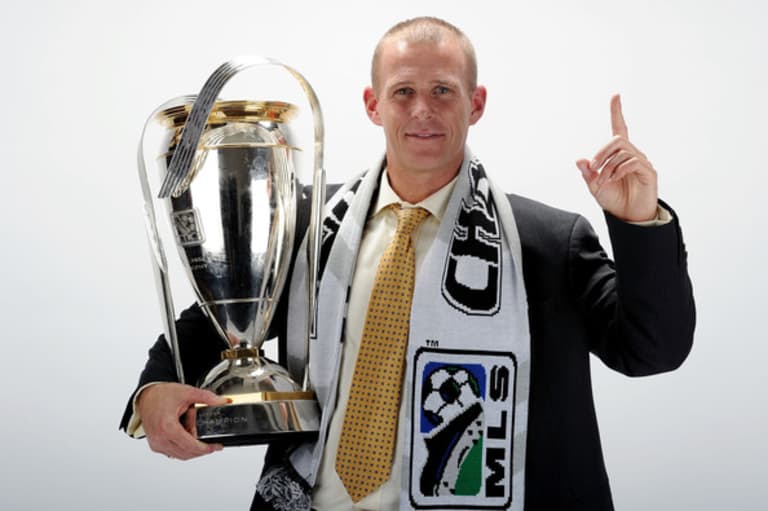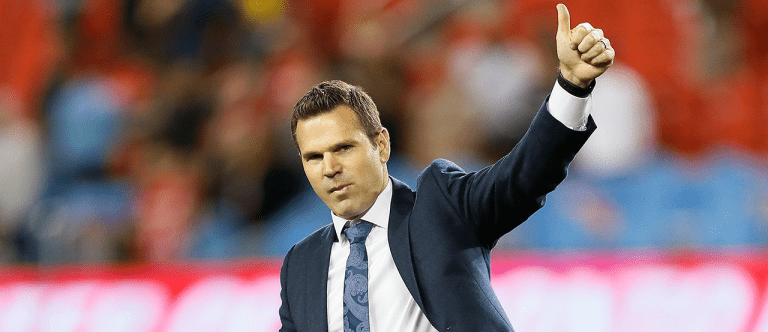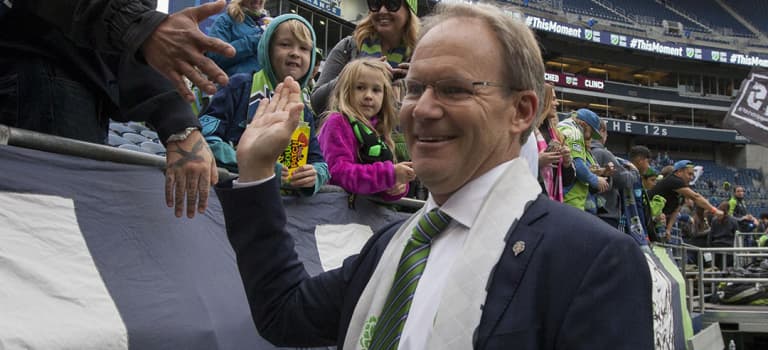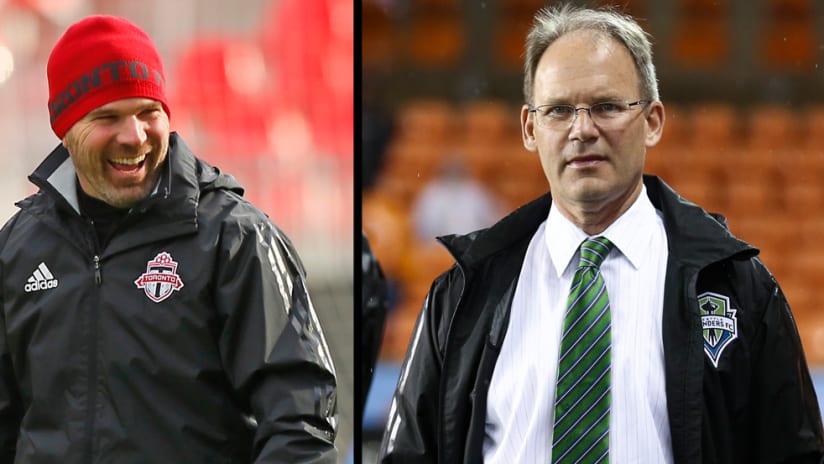I love fun facts, so let’s do a little MLS Cup trivia.
Question 1: In the last 10 MLS Cups – since 2008 – how many of the managers have been American?
I’ll give you a second.
Question 2: How many international managers have ever lifted an MLS Cup? Before you answer, let’s define “international” quickly.
I’ve always felt there’s an Americanization period that takes place in MLS. Players and managers who arrive to MLS from abroad acclimate to the country and league, and in essence become domestic products. I would not consider Oscar Pareja, for example, to fit into the “international” category. Same with Thomas Rongen and Piotr Nowak. They each had experience in American soccer prior to their head coaching gigs. It’s an imperfect distinction, but it’s an important and reasonable distinction.
Take some time to come up with an answer. I hate spoilers. Read on when you’re ready.
Who are MLS's championship coaches?
Since 2008, 18 managers in MLS Cup have been American. That’s 18 out of 20.
Only two managers in MLS Cup over the last 10 years have not been American or "acclimatized" to the American system. Juan Carlos Osorio was in charge of the New York Red Bulls in 2008 and Englishman Gary Smith led Colorado to the 2010 MLS Cup.

If you remember Gary Smith (above), you probably know the answer to the second question. Gary Smith is the only coach to arrive from overseas and win MLS Cup. But a small caveat to the 2010 MLS Cup winning team: Smith had 11 American bred – either through the youth ranks or the college system – starters on that team.
MLS has changed a ton over the years, but there’s been one ever-present pattern (don’t ask me what it says about anything; that’s a conversation for another day). And it continues in Saturday’s MLS Cup. Both Seattle and Toronto boast American coaches, with Brian Schmetzer and Greg Vanney, respectively.
It’s a trend that makes sense. MLS has unique rules. I’ve followed the league since the inception and I’m still not positive how Allocation Money works. I can only imagine the first time someone told Atlanta's Tata Martino an opposing team wanted to trade him a draft pick or GAM.
Most teams have someone other than the coach to manage the salary cap, but it still surely helps to have a manager who understands the details. Additionally, MLS has travel requirements and field conditions you don’t find in most countries. New York City FC's Patrick Vieira has undoubtedly dealt with an amazing amount of nuance in his soccer life, but he had probably never had to manage a squad through a turnaround like a Saturday game in Houston heat and then a midweek match at Gillette Stadium.
It also helps to have more familiarity with personnel in the league, to both prepare for an opposition and make transactions. Over an 11-month season, a little specific know-how goes a long way.
MLS clubs turn eyes abroad
Despite the evidence, however, MLS organizations still try their luck with importing a foreign manager. Over the last two years, five teams have gone abroad to find a leader – Chicago, Montreal, Atlanta, Colorado, and San Jose. In the same time span, five teams have hired American managers – Seattle, Orlando, LA Galaxy, New England, and RSL. Two teams have made hires that I put into the “acclimatized” category – Minnesota with Adrian Heath and Houston with Wilmer Cabrera.
Maybe an imported coach will break through one day, but for now we remain with the status quo: Americans at the helm in the last match of the season. I wish I could make a blanket statement about what American managers offer in terms of specific coaching strategy, but Vanney and Schmetzer are a prime example of the wide spectrum.

Vanney (above) is a meticulous tactician. He loves to set up the board and move the chess pieces. He takes an active approach at organizing his team and scrutinizes every detail. His most well-known move was switching to a 3-5-2 formation.
It’s been discussed widely, but there’s one additional point worth making on the formation. Necessary to the fact that the 3-5-2 is new and rare in MLS, current players have not played in it much over their careers. A professional player could run through the shifting and movement of a four-back system in his sleep. But a 3-5-2 offers new heuristics. It presents new calculations for players on spacing, angles, and decisions. It’s one thing to say a 3-5-2 offers certain advantages, but it’s another to get your team to implement a new, unfamiliar system and look comfortable. Not many coaches could pull it off as well as Vanney.
Obviously, there can be a drawback to that as well. I think Vanney has had a tendency to overthink his moves. He will often make multiple tactical switches in a single game. The constant adjustments can often overwhelm players. With a game moving fast, it can be difficult to make complex adjustments on the fly. One modification Vanney made himself in 2017 has been to stick with more consistent lineups and formations, giving his players a chance to become comfortable in their roles and assignments.

Schmetzer (above), conversely, flexes different managerial muscles. The Seattle leader doesn’t spend too much time talking about tactical details. He focuses on the club’s atmosphere. He makes the mood comfortable for his players. The players get the freedom to make their own decisions. He gives them ownership of the locker room, and his players often feel indebted to him.
One person close to the Sounders 2016 championship run said the first and most important thing Schmetzer did when he took over the reins in midseason was reunite a locker room that had grown frustrated after a run of bad results. He didn’t try to make big tactical changes, but instead had personal, intimate conversations with key players. He made sure everyone felt committed and invested in a common goal.
Schmetzer’s relaxed atmosphere can provide unpredictable performances. Without clear, decisive instruction through the team, it’s never quite clear what Seattle will look like on a given day. Sometimes they bore the heck out of everyone in the stadium, and some days they deliver intricate, flowing attacking play.
One note to keep an eye on for Saturday’s MLS Cup: Seattle's Ozzie Alonso has been ruled out. When a coach takes a hands-off approach, it generally helps to have a commanding presence in the middle of the field. When things get out of sorts, the one player can bring everyone back together, perhaps with something as possible as a confident turn out of pressure or a key interception in transition. Alonso provided those moments for Seattle in last last year’s final.
Gustav Svensson has been excellent in central midfield during the playoffs, but it’s always hard to replace an Ozzie Alonso. Schmetzer’s style won’t have one of its key components on Saturday, and it could prove a major factor.
Either way, once again MLS Cup has two American managers at the helm. American coaches often take heat, but the facts throughout MLS history speak for themselves.
Bobby Warshaw is a former professional player who played in MLS (2011-2013) and in Scandinavia after an accomplished college career at Stanford. A columnist and podcast host for Howler magazine, Warshaw is a published author and has also appeared on ExtraTime Live and ExtraTime Radio.













